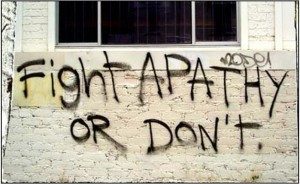I have been contemplating apathy quite a lot recently. A theme that is relevant in my reading of Percival Everett’s novel _Frenzy_. The character of Dionysus has an abundance of apathy. He feels little and cares even less. Throughout my reading of _Frenzy_ I felt familiar with the apathetic mindset of Dionysus. Yet, for the life of me, I could not figure out why Dionysus’s apathy felt familiar.
About a week ago I attended Xiuhtezcatl Martinez’s lecture on sustainability. Beyond being a highly motivational and inspiring person and speaker, Martinez helped me stumble across something very important. He said that he could not understand why the young people of today are not more involved in their local communities and in the sustainability effort. He said that he thinks the biggest thing that we, as the youth of the nation battle, is apathy. We lack hope. We lack a vision, we lack something to live for. And *ding* I understood why Dionysus’s stood out to me. It was familiar because I am surrounded by it.
As I pondered apathy, I began to wonder about what this general apathy does for the mental health of the United States. Down my path of wondering, I discovered some interesting statistics about the mental health of Americans. In the U.S. 18% of adults have a mental illness. 9.6 Million people experience suicidal ideations. Within 5 years the percentage of depressed American teens has gone from 5.9% to 8.2%. These statistics are very telling of the mindset of the United States and beg the question, why are we so apathetic, why is depression growing at such alarming rates? I cannot hope to answer these questions fully, yet I have a theory or two. I think that the levels of mental illness, specifically depression and by extension apathy, have increased in the U.S. because, along with many things, people see the world as a huge mess that overwhelms them. They see how much the environment is struggling, they see one another struggling, they feel powerless in political situations. Indeed, people feel powerless in general. In response to this feeling of powerlessness, people do nothing, hate themselves for doing nothing and continue to do nothing. This mindset creates a vicious cycle and it is dangerous for our future as individuals and as a nation.
Everett actively engages the topic of apathy in _Frenzy_ through the character of Dionysus. Why does Everett create Dionysus to be such an apathetic character? Is it solely because of Dionysus’s godliness? Or did Everett have a deeper intention? I cannot argue for what Everett’s intentions were, yet I see Dionysus’s apathy as a warning to my fellow young people. That warning is: It is dangerous to become apathetic because when we stop caring we lose what makes us human. It is little wonder that Dionysus is apathetic, he is a god. I can understand apathy when he, “must face past, present, and future, at once and perpetually.” [Everett 9]. Yet, we humans do not have that excuse. We must try to find hope, we must strive to care and find things to passionately believe in and fight for. Because if we do not, we are no better than Dionysus, that petty god.
Everett, Percival. _Frenzy_. Saint Paul, Graywolf Press, 1997.

